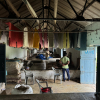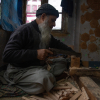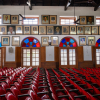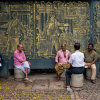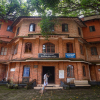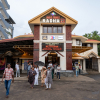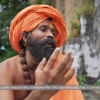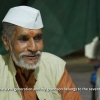Dhana Bhurabhai Shujaani: Our village is Mindiyala, my name is Dhana.
Musro Bhurabhai Shujaani: Village Mindiyala, my name is Musro.
D.B.S.: We stay here and do not go anywhere. Only during the four months of monsoon we are happy, other than that we are always in trouble. Trouble means, if there is fodder available then it is fine but if there is no fodder, the maal (herd) is unhappy and we too are unhappy.
Hanoz Patel: For how many years have you been in this occupation?
D.B.S.: This occupation? Since the times of our father and grandfather.
M.B.S.: It has been seven generations.
D.B.S.: It has been just like this.
H.P.: In these seven generations have you migrated within Gujarat, or have you been out of Gujarat as well?
M.B.S.: In Gujarat only, not outside.
D.B.S.: Gujarat. We just wander like this, we come and we go.
H.P.: Can you explain your occupation of herding the maal?
D.B.S.: We do this because we do not know any other occupation. We are ignorant about all other occupations. When we enter some space, some companies ask us to sign. But we do not even know how to sign. All we know is to live in the jungles. We can progress in this occupation but can never flourish in any other occupation.
H.P.: What do you do, to maintain your maal?
D.B.S.: The only profit for us is that we do not do any manual labour. Food for our children can be obtained through this and sometimes we get money enough to survive for 12 months. But with the maal, the entire family is always in trouble. By family I mean, children, women, elders, all face difficulties. When we wander along with the maal, women prepare rotla (rotis made of corn or bajra) and comes with the tiffin. We never manage to go outstation. Even if we need to go to Anjar, we cannot go. We cannot leave this to any other man. Even if he asks for Rs. 300 per day, he will just take the herd around and not take enough care of them. We have to give him Rs. 300 even if he brings them back starving.
H.P.: How much maal do you have?
D.B.S.: Currently, we have 400 between us, two brothers.
H.P.: Counting both goats and sheep?
D.B.S.: Yes. 400 including goats and sheep.
H.P.: What breed are they?
M.B.S.: We have all kinds of breeds. Bharadi (reddish coloured from Chhattisgarh), Ghari (dark coloured from Gujarat).
D.B.S.: Different kinds of breeds. There has not been any kind of breed, which we have not kept and herded.
H.P.: What breeds have you kept?
M.B.S.: Bharadi, Ghari, Marwadi…
D.B.S.: Another is Desi (white-coloured from Kutch)
H.P.: Which is the healthiest?
M.B.S.: Best is Bharadi.
H.P.: Where does Bharadi come from?
M.B.S.: From that side, Chhattisgarh.
H.P.: What is the difference between the local breed and Bharadi?
D.B.S.: The maal from here is very white (dhoro), while this is largely red. The lamb is red and its features are very strong. Features of the white one are very lanky. Since it looks stronger, when we do business, the stronger looking one gets sold first, the one which looks slimmer is sold second.
H.P.: When and how do you do tado (an ethno-veterinary procedure)?
D.B.S.: We do tado during a particular disease when the animal almost goes mad. We have to do a line on its head, heat a metal rod and do a tado. Sometimes it is a straight line on the head. Sometimes, a horizontal line of the nose. This is done only when the animal goes mad. Otherwise when they are affected with patto rog (disease) then we do a tado here, under the throat, near the front legs or near the chest.
H.P.: Do you have similar local medicinal procedures? For instance, if there is a fracture?
M.B.S.: That we take care of ourselves.
D.B.S.: When the leg is fractured, we collect the bark of harmo tree and then tie it on the fractured leg. While tying it we put a stick inside for support. In a week or 15 days’ time, the fracture is completely healed.
H.P.: For what other kinds of diseases do you apply medicine?
D.B.S.: There is another disease, we call it kharo or ghado in our language. During this the animal does not give milk, their knees swell up. We give them a local medicine called parbatrai, we collect it from the hilltop. We put it inside a pot used to drink water, and mix 10 litres of chaas (buttermilk), two or three litres of oil, two or three kg sugar, and let it ferment for five or six days. After that, we feed it to the animal. It has to be fed continuously for seven days, only after which can it survive and recover.
H.P.: Do you apply such medicinal techniques for people as well?
M.B.S.: Never for people. We only do it for our own maal.
H.P.: How many times a year do you sell your maal?
D.B.S.: Nothing is certain. If the maal is of good breed, if the lambs are good then we can do it three times a year. If not, we do it two times.
H.P.: How many times a year do you let them breed?
D.B.S.: We breed them two times a year. If there is enough fodder, then everybody breeds. If there is less fodder, then maybe just once.
H.P.: When do you sell and how many goats do you sell?
D.B.S.: We sell according to the demand. We sell only if we need to, not otherwise. We mostly sell around 20-25.
H.P.: What is the price of one animal?
D.B.S.: For a little one like this, we get 2000. If it is three months old, then we get 3000.
H.P.: So, is the price based on age?
D.B.S.: Yes. It depends on the age.
H.P.: In these several years of shepherding, what sort of experiences have you encountered?
D.B.S.: We maaldharis (keepers) mostly remember incidents where we have suffered losses of maal. During this recent Kandlo-Kudhio Vavajodhu (cyclone), we lost a lot of our maal. In monsoon last year, many of our maal died, we even lost count. Almost 35-40 animals died that year. Due to sudden cold 35-40 of them died together. So it is only through losses we remember, that such and such happened on such and such year.
H.P.: Are there any pleasant incidents that you remember?
D.B.S.: I do not try to remember pleasant incidents.
H.P.: Is there any significance to these clothes you wear? What are these called? The upper garment?
M.B.S.: It is called kaniyu.
H.P.: And the lower garment?
D.B.S.: Pachedi.
H.P.: And the pagadi?
D.B.S.: We call the pagadi rumaal.
H.P.: Are there any specific uses of the rumaal? Like the way you are sitting with it now?
D.B.S.: This kind of pagadi we use only sometimes, otherwise we tie a white pagadi. There is no specific reason for it. We Rabaris always tie a pagadi. Only a few people now do not tie a pagadi. There is a reason behind why we tie the white pagadi. In Rajasthan (Jaisalmer) there used to be a lot of Rabari in a Rajwadu (royal family). The king of this Rajwada once said if I marry, I would only marry a daughter of a Rabari. Rabaris lose all respect if they lose their daughter. They began to think, If we give our daughter away there would be nothing left for us. So, the Rabaris ran away from there, came here to this country and settled in Gujarat. They ran away wearing black clothes and red pagadi. When they came here, they started wearing white clothes and white pagadi.
H.P.: What is the future of this occupation according to you?
D.B.S.: This maal will not be kept for long. Now, not many want to keep animals. The jungles are gone; gauchar (common grazing lands) is also slowly diminishing. These animals need a lot of space to roam; they cannot be kept in one place for long. People who get educated refuse to join this profession. They say they will become drivers or shopkeepers.
H.P.: Does this mean the younger, educated generation will not take up this profession?
D.B.S.: No, they will not. They will get into other professions. The educated ones are not ready to come with the maal. They prefer to work for the companies, instead of wandering in the jungles. They think at least we are bringing 6000 per month. People like us, we prefer to go on like this.
H.P.: Do you feel that the younger generation should join this profession in their own way, and make use of their education?
D.B.S.: With education, people progress, come forward. I do wish that in the future this would happen.
Viral Pandya: In a year, how long do you stay away from your home?
M.B.S.: All 12 months.
V.P.: When do you go home?
D.B.S.: Once a week, or after 10-15 days.
V.P.: How far away from the village do you camp?
D.B.S.: We wander to graze in the jungles. We meet in the wada (pen), where we stay for four months and then we move from wadi to wadi (farmlands) near Khedoi village. We only stop where there is fodder for maal.
V.P.: Does anyone stop you?
D.B.S.: Yes, they do. We are not allowed in the restricted areas under the forest department.
H.P.: Does this new Kandla port flyover cause any difficulty?
D.B.S.: Yes, this new flyover causes a lot of difficulties. On this new road they have put up iron planks, due to which the animals cannot cross. Then we have to use the road under the bridge. Due to the sound of heavy traffic animals get scared, which causes a lot of difficulty.
H.P.: Then how do you cross?
D.B.S.: We have to go around it.
H.P.: Are these windmills scary for animals?
D.B.S.: Now they have become used to the windmills, earlier they were very scared of it. They did not even go near it due to the sound of the blades. They would run away. Now they have become used to it, as they are now permanent.
H.P.: What articles do you carry with you all day, when you are grazing the animals?
D.B.S.: In the jungle?
H.P.: When you are grazing the animals, what things do you carry or require for the day?
D.B.S.: I only need one stick with me.
H.P.: What about things to eat and drink?
D.B.S.: To eat and drink, we bring tea and sugar. We leave after eating in the morning and the whole day we survive on tea. We have become used to this.
H.P.: When people let you into their farms, do they ask you to do some small tasks for them?
D.B.S.: Yes. The way we did here, they make us do things on farms.
H.P.: What kind of work do they make you do?
D.B.S.: When groundnuts are harvested, they ask us to pile them up in a particular spot.
H.P.: Do they ask you to spread fertilizers?
D.B.S.: No. Nothing like that.
H.P.: What kind of festivals do the Maaldharis celebrate?
D.B.S.: Our most important festivals are when we marry our children, Akhatrij in Vaishakh month and Gokul Aatham (Gokul Asthami). We have to come during these days. Otherwise Navratri.
H.P.: How do you celebrate your festivals?
D.B.S.: For celebration, we go to Pathaji Pir where we organize a mela on a Monday in Bhadarva month. That day everybody has to come. There is a village feast, where everyone comes to eat. No matter how far off they are, they have to come.
H.P.: How many years do you keep the male or the ram?
D.B.S.: The ram for three years. Every three years we change.
H.P.: Any specific reason for this?
D.B.S.: The reason for this is the ram will mate and the lambs will be born. After three years, the young lambs would come to mating age. If we let the ram mate with its offspring, then the entire sin will fall on our heads. If we allow daughter and son to mate, we will commit a sin. Instead, it is better to sell them. Many times, we exchange rams. We Maaldharis do this often.
H.P.: What do you do to safeguard your herd at night?
D.B.S.: At night, we keep them in the wada (pen).
H.P.: Do you have to be vigilant?
D.B.S.: Yes, we have to be vigilant. Sometimes, dogs come; sometimes thieves come. We do not trust anyone.
H.P.: Does gando bawar (an invasive plant species) cause any difficulties?
D.B.S.: Yes, it causes a lot of difficulties, because it is very thorny.
H.P.: What kind of difficulties?
D.B.S.: During monsoons, only a few animals can walk properly otherwise most of them get thorns in their feet. We remove the thorns and inject them with teramycine. The grass that grows below the tree is very salty so they don’t consume it. After monsoon, they do not eat much of the grass which grows under gando bawar. These trees grow so much that you cannot see beyond them. There was no problem when this tree was not here.
H.P.: Does gando bawar have an effect on other trees?
D.B.S.: It sucks away the essence of other trees. It has many roots which reach very deep.
V.P.: When, where and any specific way you get tattoos (chundada)?
D.B.S.: This you can count as fashion. Like you have come to us, the person who does tattoo (tajiyu) comes to us to ink our bodies.
V.P.: Any specific designs?
D.B.S.: Nothing in particular, whatever he has in his mind.
V.P.: What kinds of ornaments do you wear? For instance, there is kada, butti (earring), and necklace?
D.B.S.: In the middle here, we wear thori. Here, kanku like a kothi made of gold. We also wear thoriyu and a kadu on the hand.
V.P.: In the neck?
D.B.S.: In the neck we only wear a chain, nothing else.
H.P.: What ornaments do women wear?
D.B.S.: There is nothing fixed, some wear finger rings (viti), some wear earrings (butti). Some wear haar (necklace), which may be worth one to two lakhs. There is no limit to it.
V.P.: How do you gauge what time of the day it is?
D.B.S.: We just look up and predict based on God’s gift. But there can be some differences.
H.P.: Do you use similar techniques for predicting the weather?
D.B.S.: Now it is winter, which is coming to an end. It will be cold only for a month. After Poh and Nari month it will be very cold. This is our mathematics. Then after Magh winter will decline. After Uttarayan, it will be completely over. Then in Chaitar and Vaishakh month it will be summer. Chaitar, Vaishakh and Jeth, three months. With Ashad comes the rain which will continue till Shravan. The one who has it in its fate will get it. The one who has it in its fate will get it. All the Rabaris are now planning to go to Gujarat (i.e., leave Kutch). Then after wandering they will return back here in the monsoon.
V.P.: While grazing the animals, you made a sound at which all animals flocked around you. How do you do this?
D.B.S.: This is our occupation. They have become used to us. If you make the sounds (hakal), then they will not come.
V.P.: Are there any specific types of sound, or do you train them?
D.B.S.: We train them. We have looked after them since childhood and brought them up, they have to come with us.
V.P.: What kind of sounds do you make?
D.B.S.: There are several. But two-three types mostly. One sound for going and one sound for coming. They follow their mothers mostly. Their mother sometimes understands our language.
V.P.: How do identify your maal?
D.B.S.: This maal of mine, even if it gets mixed up with other maal with up to 5000 animals, I can search and easily identify them.
V.P.: Do you use any marks or anything similar?
D.B.S.: No. It is because of Dhanteras that we did all these marking dots, this colour. Otherwise we never make these markings.
H.P.: How do you identify them, then?
D.B.S.: We identify them by their faces.
H.P.: Do you sell the wool?
D.B.S.: Earlier it used to be sold, now not that much is sold. Five years ago, we used to get Rs. 5 per kg or Rs. 10 per kg. Now, nobody takes it.
M.B.S.: Earlier, we used to get Rs. 20 per animal. Now we have to pay Rs. 10 to shave hair.
H.P.: Do you use the wool for yourself?
D.B.S.: No, we cut and throw it away. Nobody wants to take it. What do we do with it?
H.P.: Does anybody make use of it?
D.B.S.: It goes out of the country, there are many big traders, who get it cut and take it away. They fill up vehicles with it and take them away. So, they have a use for it, only then would they take it.
M.B.S.: These days cotton is used in large quantities.
D.B.S.: Earlier there was no cotton but now there is a lot of cotton in fields.
M.B.S.: Cotton is used more than wool.
V.P.: Do you sell milk?
D.B.S.: Yes, milk is sold. Everything can be sold, but we do not do business in milk. We only sell the lambs.
H.P.: How many times do you have to feed them water?
D.B.S.: Two times. If we get water, then three times but if not at least two times.
H.P.: For how many years can a maaldhari continue in this profession?
D.B.S.: As long as he has his strength, and can find people to help him graze.
H.P.: So, if one does sell off one's maal, what are the common reasons for selling? If one decides to stop, take up some other business, what are the reasons for this?
D.B.S.: The reasons for it are same, that you cannot find a person to help you graze. Or when there is an event, then we do not find a person to graze them. Assume, it is my son’s marriage, then for 10-15 days we have to go home. Then it is difficult to find people to graze them. Then if a maaldhari does not have a brother and is alone, he will have to sell it off only for this reason.
V.P.: Don’t you want to retire?
M.B.S.: I have sold off my stock at least four to five times. But I came back.
D.B.S.: He went into a company. He grazed the buffaloes of the village. Then grazed the cows. He did not enjoy any profession, so he came back.
M.B.S.: Age is just another thing for us. Look at our father, he still comes walking with us.
D.B.S.: We have never sold our maal since our grandfather’s time.
V.P.: You have sons; one day they will take over. What then, will you sit at home?
D.B.S.: Yes. I will sit at home. I will sit for four months at home and then I will come back. I will sit and look after the lambs.
V.P.: You will just look after the lambs in the wada?
D.B.S.: Yes. Just look after the lambs in the wada. Like our father is now taking care of the wada.
H.P.: A while back you explained the types of soil around here. Can you explain again?
D.B.S.: In Kathi Taluka, Mundra Taluka, Mandvi Taluka everywhere the soil is mori (neither salty nor sweet). Here in Bhuj Taluka and Anjar Taluka, the soil is sweet in all villages. When the maal grazes in this soil they become very strong. The strength gained will never diminish. When they graze a lot in mori land, their strength diminishes in the winter season.



